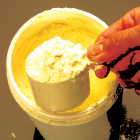 I love protein. In fact, my colleague Lonnie Lowery, Ph.D., R.D., and I just published a book on protein called Dietary Protein and Resistance Exercise. If you’re a protein lover, check it out. It’ll make your day, your month or maybe your year!
I love protein. In fact, my colleague Lonnie Lowery, Ph.D., R.D., and I just published a book on protein called Dietary Protein and Resistance Exercise. If you’re a protein lover, check it out. It’ll make your day, your month or maybe your year!
Let’s face it, protein is needed for pretty much everything in your body, and the data on its profound effects are robust and voluminous. Some might say that high-protein diets are controversial—but those are the folks who can’t read and refuse to learn the scientific literature.
For instance, a recent study evaluated the effects of long-term isocaloric high-animal-protein intake on insulin secretion in diet-induced obese rats.1 Isocaloric means that all the diets had the same number of calories. After 24 weeks the fat rats that were fed high-protein diets had less bodyweight gain and less visceral fat—meaning the fat around the organs—than the rats that got normal-protein diets. Also, the insulin response was less in the high-protein group.
So even with fat rats, giving them a bucketful of protein improves their body composition and makes ’em healthier!
One of the more intriguing studies in humans looked at the effects of four different low-calorie, or hypocaloric, diets.2
Thirty-five fat men were randomly assigned to one of the four treatments for eight weeks: a control diet, a legume diet, a fatty-fish diet or a high-protein diet. Body composition, blood pressure, resting energy expenditure, mitochondrial oxidation, blood biomarkers and dietary intake were assessed.
Who lost the most weight? The high-protein and legume dieters did. If you’re wondering what a legume is, the category includes peanuts, peas, beans, soy and lentils. High-density-lipoprotein-cholesterol concentrations were reduced in all dietary groups except for those who got the fatty-fish diet. That’s odd. I would have expected the fish to have helped, but, as they say, the data is the data.
Total and low-density-lipoprotein cholesterol also were significantly improved by the legume diet, while the “homeostatic model assessment index of insulin resistance value was significantly reduced in those men following the high-protein diet.” Translation: The high-protein diet was best at improving insulin metabolism. Thus, a low-calorie diet that includes lots of legumes or protein seems the best for promoting health and weight reduction.
In conclusion, protein is damn good, but bodybuilders know that already.
Editor’s note: Jose Antonio, Ph.D., is an assistant professor at Nova Southeastern University in sunny south Florida.
1 Chen, H., et al. (2012). Long-term high animal protein diet reduces body weight gain and insulin secretion in diet-induced obese rats. J Sci Food Agric.
2 Abete, I., et al. (2009). Legume-, fish-, or high-protein-based hypocaloric diets: effects on weight loss and mitochondrial oxidation in obese men. J Med Food. 12:100-8.




















You must be logged in to post a comment Login